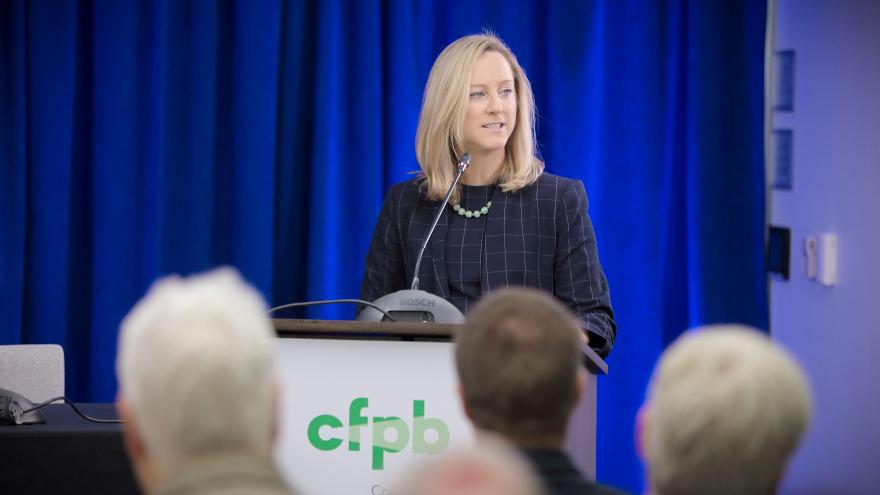Consumer complaints to CFPB hit record volume during pandemic

Consumer Financial Protection Bureau director Kathleen Kraninger. Photo courtesy of the CFPB.
By subscribing, you agree to receive communications from Auto Remarketing and our partners in accordance with our Privacy Policy. We may share your information with select partners and sponsors who may contact you about their products and services. You may unsubscribe at any time.
WASHINGTON, D.C. –
Consumer Financial Protection Bureau director Kathleen Kraninger had a busy public agenda last week, sharing remarks at National Association of Realtors 2020 legislative meetings as well as the public meeting of the Financial Literacy and Education Commission, along with a gathering of the Financial Stability Oversight Council.
During each of her appearances, Kraninger referenced the record volume of consumer complaints the bureau has recently received as well as what federal plans are in motion to help individuals and businesses impacted financially by the coronavirus pandemic.
“There is no doubt that COVID-19 has had a profound impact on our country, our economy and our individual lives,” Kraninger said at the meeting of regulators orchestrated by Treasury Secretary Steven Mnuchin.
“At the Consumer Financial Protection Bureau, we are focused on protecting consumers in the financial marketplace. That entails ensuring consumers have information on their rights, protections and options as well as ensuring financial institutions are in compliance with federal consumer financial law,” Kraninger continued.
“Through robust engagement with financial institutions, consumer advocates, government partners, and the public directly, the bureau monitors what is happening in the market and takes appropriate action,” she added.
Kraninger pointed out in March and April the bureau received approximately 36,700 and 42,500 complaints, respectively, marking the highest monthly complaint volumes in the CFPB’s history. She did not specifically mention auto financing when noting the volume figures; instead touching on credit reporting, debt collection, mortgages and credit cards as the generators of most complaints.
Subscribe to Auto Remarketing to stay informed and stay ahead.
By subscribing, you agree to receive communications from Auto Remarketing and our partners in accordance with our Privacy Policy. We may share your information with select partners and sponsors who may contact you about their products and services. You may unsubscribe at any time.
“A significant portion of complaints as a result of the pandemic are about issues consumers encounter when seeking alternative payment options for their mortgages, credit cards, auto loans and leases, student loans and other loans,” Kraninger said during the public meeting of the Financial Literacy and Education Commission, which she serves as vice chair.
“Consumers report that they are seeking changes to loan terms, such as suspension of payments, lower interest rates, longer loan terms and other ways to postpone or lower monthly payments because they have lost their jobs or are working fewer hours,” she continued. “The bureau’s complaint system and other stakeholder engagement mechanisms are important in informing the bureau’s work, including our supervisory and enforcement activity.
“I want to make clear that at all times, and particularly during this unprecedented crisis, we will not hesitate to take public enforcement action against companies or individuals that engage in unfair, deceptive, or abusive acts or practices, or otherwise violate consumer financial law,” Kraninger added.
“We are monitoring the marketplace in real time and coordinating on an ongoing basis with federal and state agencies and regulators. We are taking, and will continue to take, swift action when we identify companies or individuals that violate the law to exploit consumers,” she went on to say.
Kraninger acknowledged consumers are facing significant financial challenges. She referenced the bureau’s “Making Ends Meet” survey conducted last year that determined 52% of households would not be able to cover expenses for more than two months if they lost their main source of income by borrowing, using savings, selling assets or seeking help from friends or family.
“During this challenging time, I appreciate the commitment of everyone to come together and help consumers. We are all in this together and helping every consumer in need is our goal,” Kraninger told the National Association of Realtors.
“As was noted in my introduction, I worked in government during 9/11 and one of the things that struck me most was how Americans come together during a crisis,” she continued. “Regardless of how we identify based on where we live or our beliefs, we band together in time of need and help each other. I know that we have already been doing that and will continue to do so during the pandemic.”


